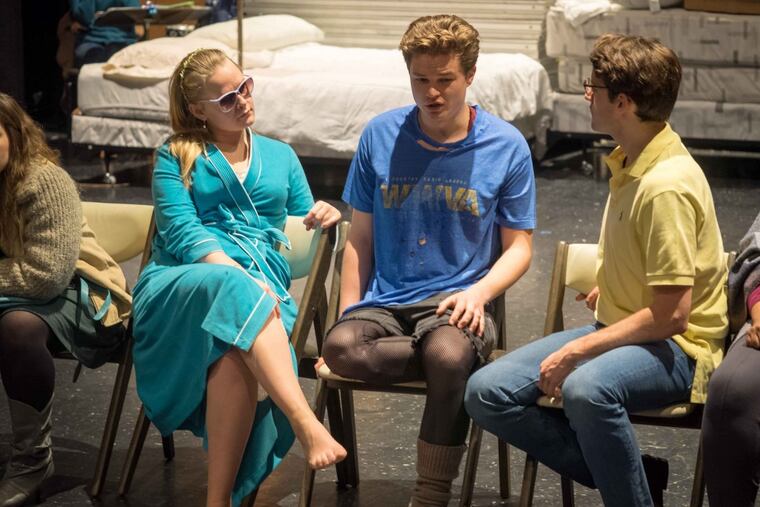Leonard Bernstein's oddball opera 'A Quiet Place' improves in Curtis staging, but it ain't there yet
Leonard Bernstein's messy 'A Quiet Place' is still kind of a mess in a new coproduction by the Curtis Institute, Opera Philadelphia, and the Kimmel Center. But this edition is a good step forward.

The world is full of messy artistic masterworks that defy the usual aesthetics because they go to places that are hard to reach any other way.
Leonard Bernstein's late-period opera A Quiet Place may yet ascend to that loose-ends pantheon (also occupied by Mahler's Symphony No. 7) — with significant help from Curtis Opera Theatre's new production of the opera that opened Wednesday at the Kimmel Center's Perelman Theater.
But it ain't there yet.
Those who like opera without easy answers and those who are curious about Bernstein simultaneously utilizing and rejecting everything he knows will find the experience to be stimulating — though incomplete.
When it's seen at all, this 1983 portrait of a family shattered by its mother's suicide is usually presented in conjunction with Bernstein's earlier jazz chamber opera Trouble in Tahiti, where these characters start down their long, stultifying road to emotional isolation and life lived in default settings.
Trouble in Tahiti is not part of the new Garth Edwin Sunderland edition of A Quiet Place, which attempts to stand on its own. In place of the Broadway-tinged songs of Tahiti, it's a continual operatic outpouring that is as harmonically unstable as its characters.
This edition tries to tame the opera's grandeur — to present its intimate story on a scale that doesn't sell the characters as being larger than their everyday American selves.
Bernstein's full orchestra is reduced to a chamber version that easily fits in the Perelman Theater, and it's thoroughly successful in capturing the opera's confrontational fury, especially as conducted by Corrado Rovaris.
Bringing the characters more clearly into the foreground, though, also makes the ambiguities loom larger. When one character sings about incest, is it a confession or delusion? Another character changes his sexual affiliations, but with what significance?
The best moments come when musical and dramatic details accumulate in ways that make you feel like these characters are inside of you rather than onstage. But much of the music that Sunderland restored from previous versions of A Quiet Place, however beautiful, also upsets the dramatic trajectory.
The bitter heart of the family's patriarch — who is curiously played in this production more like an older brother to his children than a father — softens too early, subverting the impact of the final resolution. Choral effects were cut, and that's a loss, since they had underscored how certain events in the present are echoing from the past.
This brilliant but digressive opera was treated to a brilliant but discursive production directed by Daniel Fish. The dead mother became a significant (though non-singing) presence by showing up at her own funeral (dressed in mink rather than black) and, later on, in what appeared to be antique home movies.
Similarly aged video appeared in Fish's portrait of a 1940s movie star in the Michael Gordon opera Acquanetta. But the Curtis production's use of the technology, by video designer Jeff Larson, had far greater emotional impact.
Other touches were imprecise wild cards. When we realized how messed up the Quiet Place family is at the end of Act I, the production had a huge photo of the burning Hindenburg (which has way too many possible interpretations).
The singers were excellent. As daughter Dede, Ashley Milanese immediately established her vocal charisma, and maintained it in some of Bernstein's more difficult vocal writing, culminating in an emotionally profound communion with her deceased mother. Jean-Michel Richer gave a suitably French timbre to the French-Canadian character Francois.
As the mentally ill Junior, Dennis Chmelensky articulated his fractured vocal lines in ways that perhaps set a new standard for the role — while also projecting a flamboyant battiness that suited the character well. Tyler Zimmerman sang intelligently but, as the thorny Dad, missed much of his character's deep wells of anguish.
Or so it seemed here. What A Quiet Place is — and how it's perceived — remains in a great state of flux.